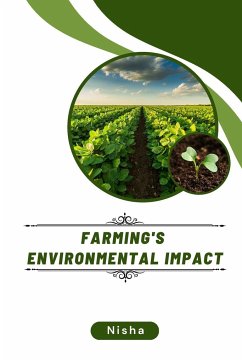Farming's Environmental Impact" is an insightful book by author Nisha that sheds light on the ecological consequences of modern-day agriculture. The book delves into the various environmental challenges posed by farming, including soil degradation, water pollution, greenhouse gas emissions, and loss of biodiversityNisha presents a comprehensive analysis of the current state of farming practices and their impact on the environment. She highlights the need for sustainable farming techniques that can meet the food demands of a growing population while minimizing the negative effects on the planetThroughout the book, Nisha provides examples of successful sustainable farming methods that can be adopted by farmers to reduce their environmental impact. She emphasizes the importance of adopting regenerative farming practices, such as crop rotation, conservation tillage, and cover cropping, to improve soil health and reduce the use of harmful pesticides and fertilizers.Additionally, the book explores the role of technology in sustainable farming, including precision farming techniques and the use of renewable energy sources. Nisha also discusses the need for policy changes at the government level to support sustainable farming practices and reduce the environmental impact of agriculture
